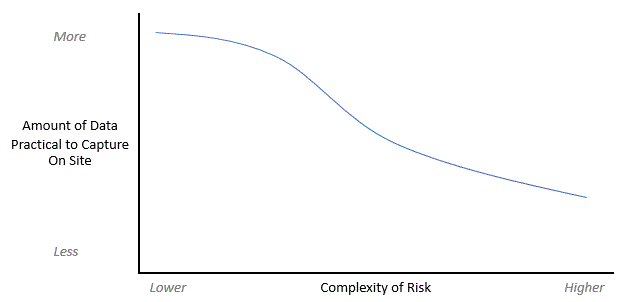
There is no doubt that mobile technology has opened up new ways of doing business for insurance organizations. Not only has it enabled new channels of communication, it has also liberated many from the desk-shackled days of old and allowed them to carry computing power with them where they need it most.
There has been excitement about mobile technology for loss control professionals since the first clunky tablet computers hit the market in the early 2000’s, but for many who dipped their toe in these early tablet waters, they soon found out it was no productivity silver bullet. Although mobile technology in loss control has great potential for productivity improvement, it presents a number of challenges that must be addressed in order to effectively leverage mobile.
These are our 4 rules for ensuring a successful deployment of mobile tablet technology within your loss control team:
1. Customer service comes first
The risk control teams we work with who have the most successful programs realize that loss control is not simply a data-collection function, but a vital link (and often the only direct link aside from claims) to the insured. Certainly the loss control professional gains valuable insight into the risk while on site, but even more importantly, they can foster a relationship with the client which plays a key role in account performance, policy retention and overall customer satisfaction.
It is imperative that the level of customer service provided by your risk management consultants is not hampered by putting a screen between them and the insured.
By following the next 3 rules, you will be able to ensure a successful tablet roll-out to your loss control team:
2. Align expectations around field data capture
Loss control executives often ask if it is realistic to have their consultants capture 100% of the data pertaining to a survey or service visit in the field on a tablet device. Like many philosophical business questions, the answer is always – it depends.
We often start with a very simple-to-understand graph scrawled on the white board which shows the relationship between risk complexity and field data capture. From our experience working with loss control teams in all imaginable lines of business, we have identified a negative correlation between the complexity of the risk and the amount of data it is practical to enter on site during a loss control visit.
The graph looks something like this:

Very simply, for less complex risks (think personal lines or main street commercial risks) consultants should have the ability to very efficiently capture most or all of the data while on site using a tablet device. As risk complexity increases, the need for more narrative explanation, research and analysis grows, and thus the user is less able to describe and provide an opinion of the risk using a simplified data entry format suitable to tablet usage.
Note however, that even for more complex risks, we have found it is almost always practical for a consultant to leverage the tablet device on site for a number of activities:
- Capturing photos of the premises.
- Capturing recommendations (especially efficient if leveraging standard recommendations wordings as the starting point).
- Presenting resources or training material to the insured (e.g. here is a photo of how this machine should be guarded).
- Capturing some level of rough notes to be converted to detailed narrative at a later time.
In short, when looking to deploy mobile devices to your risk control consultant, be critical and realistic about what data they will be able to capture in the field. Also keep in mind this may vary by individual risk conditions and even by individual user depending on their technical capabilities.
3. Obsess over user adoption
Poor user adoption is the ‘silent killer’ of IT projects, yet it still garners little praise as a major contributor to the overall success of technology roll-outs. In our experience, many loss control consultants are initially keen on the concept of a mobile tablet deployment, but when they come to the realization that it will require them to change habits that have been engrained over the course of their careers, this enthusiasm dampens.
To ensure a smooth transition, we recommend a phased deployment of the tablet hardware following an initial software adoption period (since a sound tablet implementation will include both a software and a hardware aspect). This approach ensures the user base is comfortable with the new software prior to adding a new piece of hardware to the mix, smoothing out the learning curve.
We also recommend appointing a ‘user adoption champion’ within your organization whose responsibility it is to ensure your consultants are using the new platform to its fullest. Inevitably there will be users who will struggle with the new technology (as well as those who will search for any reason not to use it!), and the user adoption champion is the one these individuals can turn to during these times of need.
4.Monitor, Measure and Modify
The beauty of configurable software solutions available today is that you don’t need to attempt to get everything 100% perfect out of the gate. This opens doors to a new way of deploying technology that can be iterative in nature – not just during implementation, but even following the initial roll-out.
It is important during the early days of a loss control mobile tablet deployment to:
Monitor the usage of the system and actively solicit feedback from users.
Measure all aspects of your new process to pinpoint issues and identify areas for additional training or potential changes.
Modify (configure) the solution based on your findings in order to optimize user efficiency, adoption and ultimately maximize your ROI.
For more information or case studies on implementing a tablet-based loss control software system within your organization, contact one of our experts.



